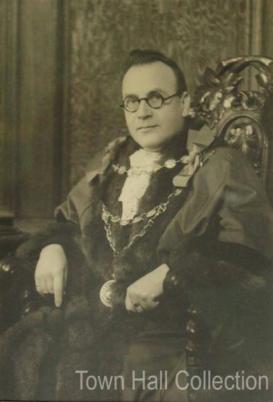Bramwell (Bram) Longstaffe was twice elected Mayor of the Borough of Barrow-in-Furness, in 1934-1935 and 1935-1936, and a primary school in Barrow is named after him.
During the First World War Bram Longstaffe was the local Branch Secretary of the Independent Labour Party and of the No Conscription Fellowship. He was jailed as a non-cooperative conscientious objector and in addition was sentenced to a month's hard labour in September 1916 on the trumped-up charge that he had used language likely to cause disaffection among the civilian population, contrary to the Defence of the Realm regulations. The Chief Constable wrote personally to the Watch Committee to ensure that Longstaffe's appeal against this sentence was dismissed at the following Quarter Sessions in Lancaster. At the instigation of the local Conservative Party he was struck from the list of electors in 1919 but despite this he was still able to stand for the Borough Council and was duly elected.
On his death at the young age of 57, the presiding magistrate said in tribute that Bram Longstaffe was a man who 'at the cost of considerable suffering, pain, and anxiety, and apparently at the sacrifice of all future prospects, had on occasion taken stands which brought him anything but popularity.'
On Bram Longstaffe's gravestone in Barrow Cemetery are inscribed these lines by Ralph Chaplin:
Mourn not the dead that in the cool earth lie,
Dust unto dust,
The calm sweet earth who mothers all who die,
As all men must,
But rather mourn the apathetic throng,
The cowed and meek,
Who see the world's great anguish and its wrong,
And dare not speak.
This small mounted black and white photograph of Bramwell Longstaffe by Storey is now kept at the Dock Museum, Barrow-in-Furness.


